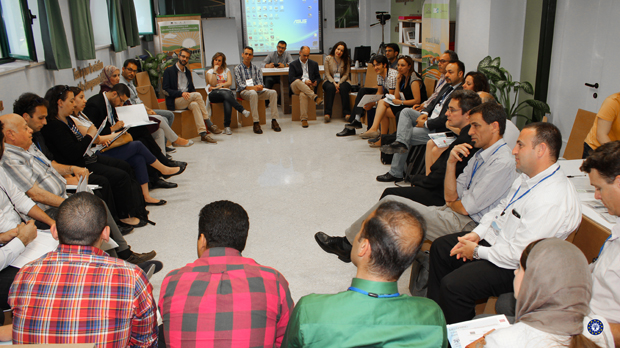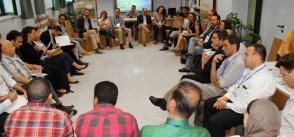
3rd Brokerage Event | What they say about us
From Puglia a challenge to the startup sector: what happened during the MedSpring event in Bari*
30 entrepreneurs from seven Mediterranean countries gathered at CIHEAM for the third edition of the Euro-Mediterranean event brokerage & venturing on research and innovation. In view of the future, they bet on water, food and energy...
Two million arable acres for two billion turnover: ladies and gentlemen, this is Puglia. In one of the Italian regions with the strongest agricultural vocation, the third edition of the Euro-Mediterranean brokerage & venturing event on research and innovation was held on 26-27 May. The event, funded by the European Commission, aims to bring together entrepreneurs, researchers, startups, research institutes, networks of public and private sector. The 30 entrepreneurs from seven Mediterranean countries (Egypt, Iraq, Iran, Italy, Jordan, Morocco and Tunisia) launched a challenge to the future in the name of sustainability and innovation. The fields of the business ideas presented during the event are food, water and energy.
"You have to add value to research and innovation in the food system and with MedSpring we can do that," said Sharon Cittone, marketing director of Seed and Chips.
While we are witnessing a digital renaissance in the food sector around the world (for a value of 5,000 billion euro), we are also called to face difficult challenges related to security, sustainability, safeguarding bio-diversity, and preserving products’ authenticity. Events like the one hosted at Ciheam, is a way to look at these challenges from different geographical angles and cultures.
Problems and solutions
"Solutions to problems that seem distant from our own problems as the one proposed by the innovators coming from the Mediterranean countries, must make us think" explains Claudio Bogliotti, head of MedSpring project. "A startup that develops a device for purifying textile industry wastewater, seeks to solve the problem of water scarcity, a condition that is shared by many countries represented during the event. “But we may soon need similar solutions”. One of the issues most felt and explored during the event MedSpring is precisely the lack of drinking water and the need to reduce waste. The startup that Bogliotti mentions was born in the German Jordanian University: the research conducted by Malyuba Abu-Daabes pioneers a geopolymer able to filter wastewater produced by textile industries, and thus removing heavy metals from the liquid. Similarly, the startup of Paolo Stufano, Eggplant, turns wastewater produced by food manufacturers into bio-plastic.
Reducing waste
With the objective of reducing waste and create energy out of it, innovations Made in Italy find new application in the food sector. Among the many projects presented at the event, Vittorio Bava’s Diptera stands out. Diptera collects fruit and vegetable waste from food industries in Puglia and converts it into proteins through larvae used in bio-farming. Through this process the company produces proteins- and lipids-rich feed, which is used to feed animals or as fertilizers. Cutting waste is also the goal of a startup that sees in chicken meat the future sustainable reserve of protein: Ziv Dubinsky and its Metabolic Robot measures the efficiency of chicken farms, ensuring animal welfare and limiting waste. According to an estimate, the IoT device is able to produce 20% more profits. What would happen if similar devises are not only applied to small Israeli farms, but also to larger producers such as Hague or Amadori?
No waste
Finally, in the "no waste" sector, Yassine Maghnouj showed that with his project Evaptainers it is even possible to exploit and recycle heat. Maghnouj created a portable refrigerator that works only with water: it does not require either power or ice (also because, to make ice, electricity is needed). The idea comes from a research that an MIT professor commissioned to Maghnouj and his colleagues: inventing something that could help a billion people. Yassine saw how hard it was for his fellow Moroccans to go from rural to urban centres to buy or sell food and how how much food was wasted during the journey, that could take up to three days. Now, with just over 28 euro, Moroccan families living in the countryside can store their own food without the need for electricity. After the first doubts, Maghnouj realized that the idea was good and could really help someone. He is now looking for sponsors, but what really matters to him is that his invention has a social impact. To realize his idea, he left Xerox, where he used to work. This is really the power of innovation!
* This article was initially published in @startup_italia by @Stefania Leo. The original article in Italian can be found here, released under a Creative Commons license 3.0.
Translation by @AgoraMedSpring







